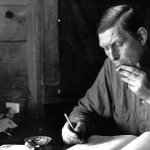i
The children on the lawn
joined hand to hand
go round and round
each arm going into
the next arm, around
full circle
until it comes
back into each of the single
bodies again
They are singing, but
not to each other:
their feet move
almost in time to the singing
We can see
the concentration on
their faces, their eyes
fixed on the empty
moving spaces just in
front of them.
We might mistake this
tranced moving for joy
but there is no joy in it
We can see (arm in arm)
as we watch them go
round and round
intent, almost
studious (the grass
underfoot ignored, the trees
circling the lawn
ignored, the lake ignored)
that the whole point
for them
of going round and round
is (faster
slower)
going round and round
ii
Being with you
here, in this room
is like groping through a mirror
whose glass has melted
to the consistency
of gelatin
You refuse to be
(and I)
an exact reflection, yet
will not walk from the glass,
be separate.
Anyway, it is right
that they have put
so many mirrors here
(chipped, hung crooked)
in this room with its high transom
and empty wardrobe; even
the back of the door
has one.
There are people in the next room
arguing, opening and closing drawers
(the walls are thin)
You look past me, listening
to them, perhaps, or
watching
your own reflection somewhere
behind my head,
over my shoulder
You shift, and the bed
sags under us, losing its focus
there is someone in the next room
there is always
(your face
remote, listening)
someone in the next room.
iii
However,
in all their games
there seems
to be some reason
however
abstract they
at first appear
When we read them legends
in the evening
of monstrous battles, and secret
betrayals in the forest
and brutal deaths,
they scarcely listened;
one yawned and fidgeted; another
chewed the wooden handle
of a hammer;
the youngest one examined
a slight cut on his toe,
and we wondered how
they could remain
completely without fear
or even interest
as the final sword slid through
the dying hero.
The next night
walking along the beach
we found the trenches
they had been making:
fortified with pointed sticks
driven into the sides
of their sand moats
and a lake-enclosed island
with no bridges:
a last attempt
(however
eroded by the water
in an hour)
to make
maybe, a refuge human
and secure from the reach
of whatever walks along
(sword hearted)
these night beaches.
iv
Returning to the room:
I notice how
all your word-
plays, calculated ploys
of the body, the witticisms
of touch, are now
attempts to keep me
at a certain distance
and (at length) avoid
admitting I am here
I watch you
watching my face
indifferently
yet with the same taut curiosity
with which you might regard
a suddenly discovered part
of your own body:
a wart perhaps,
and I remember that
you said
in childhood you were
a tracer of maps
(not making but) moving
a pen or a forefinger
over the courses of the rivers,
the different colours
that mark the rise of mountains;
a memorizer
of names (to hold
these places
in their proper places)
So now you trace me
like a country’s boundary
or a strange new wrinkle in
your own wellknown skin
and I am fixed, stuck
down on the outspread map
of this room, of your mind’s continent
(here and yet not here, like
the wardrobe and the mirrors
the voices through the wall
your body ignored on the bed),
transfixed
by your eyes’
cold blue thumbtacks
v
The children like the block
of grey stone that was once a fort
but now is a museum:
especially
they like the guns
and the armour brought from
other times and countries
and when they go home
their drawings will be full
for some days, of swords
archaic sunburst maces
broken spears
and vivid red explosions.
While they explore
the cannons
(they aren’t our children)
we walk outside along
the earthworks, noting
how they are crumbling
under the unceasing
attacks of feet and flower roots;
The weapons
that were once outside
sharpening themselves on war
are now indoors
there, in the fortress,
fragile
in glass cases;
Why is it
(I’m thinking
of the careful moulding
round the stonework archways)
that in this time, such
elaborate defences keep
things that are no longer
(much)
worth defending?
vi
And you play the safe game
the orphan game
the ragged winter game
that says, I am alone
(hungry: I know you want me
to play it also)
the game of the waif who stands
at every picture window,
shivering, pinched nose pressed
against the glass, the snow
collecting on his neck,
watching the happy families
(a game of envy)
Yet he despises them: they are so
Victorian Christmas-card:
the cheap paper shows
under the pigments of
their cheerful fire-
places and satin-
ribboned suburban laughter
and they have their own forms
of parlour
games: father and mother
playing father and mother
He’s glad
to be left
out by himself
in the cold
(hugging himself).
When I tell you this,
you say (with a smile fake
as a tinsel icicle):
You do it too.
Which in some ways
is a lie, but also I suppose
is right, as usual:
although I tend to pose
in other seasons
outside other windows.
vii
summer again;
in the mirrors of this room
the children wheel, singing
the same song;
This casual bed
scruffy as dry turf,
the counterpane
rumpled with small burrows, is
their grassy lawn
and these scuffed walls
contain their circling trees,
that low clogged sink
their lake
(a wasp comes,
drawn by the piece of sandwich
left on the nearby beach
(how carefully you do
such details);
one of the children flinches
but won’t let go)
You make them
turn and turn, according to
the closed rules of your games,
but there is no joy in it
and as we lie
arm in arm, neither
joined nor separate
(your observations change me
to a spineless woman in
a cage of bones, obsolete fort
pulled inside out),
our lips moving
almost in time to their singing,
listening to the opening
and closing of the drawers
in the next room
(of course there is always
danger but where
would you locate it)
(the children spin
a round cage of glass
from the warm air
with their thread-thin
insect voices)
and as we lie
here, caught
in the monotony of wandering
from room to room, shifting
the place of our defences,
I want to break
these bones, your prisoning rhythms
(winter,
summer)
all the glass cases,
erase all maps,
crack the protecting
eggshell of your turning
singing children:
I want the circle
broken.




















Comment form: